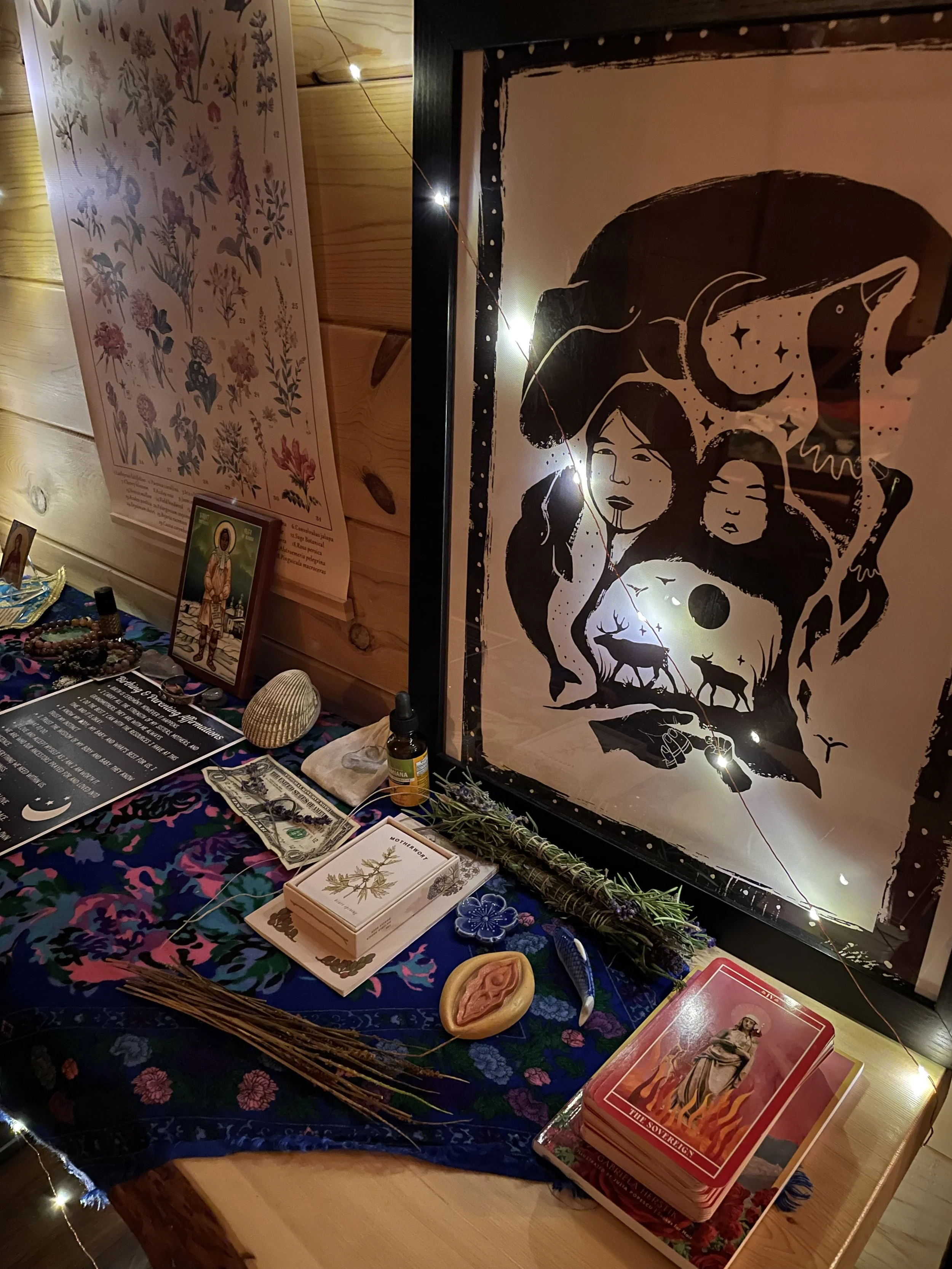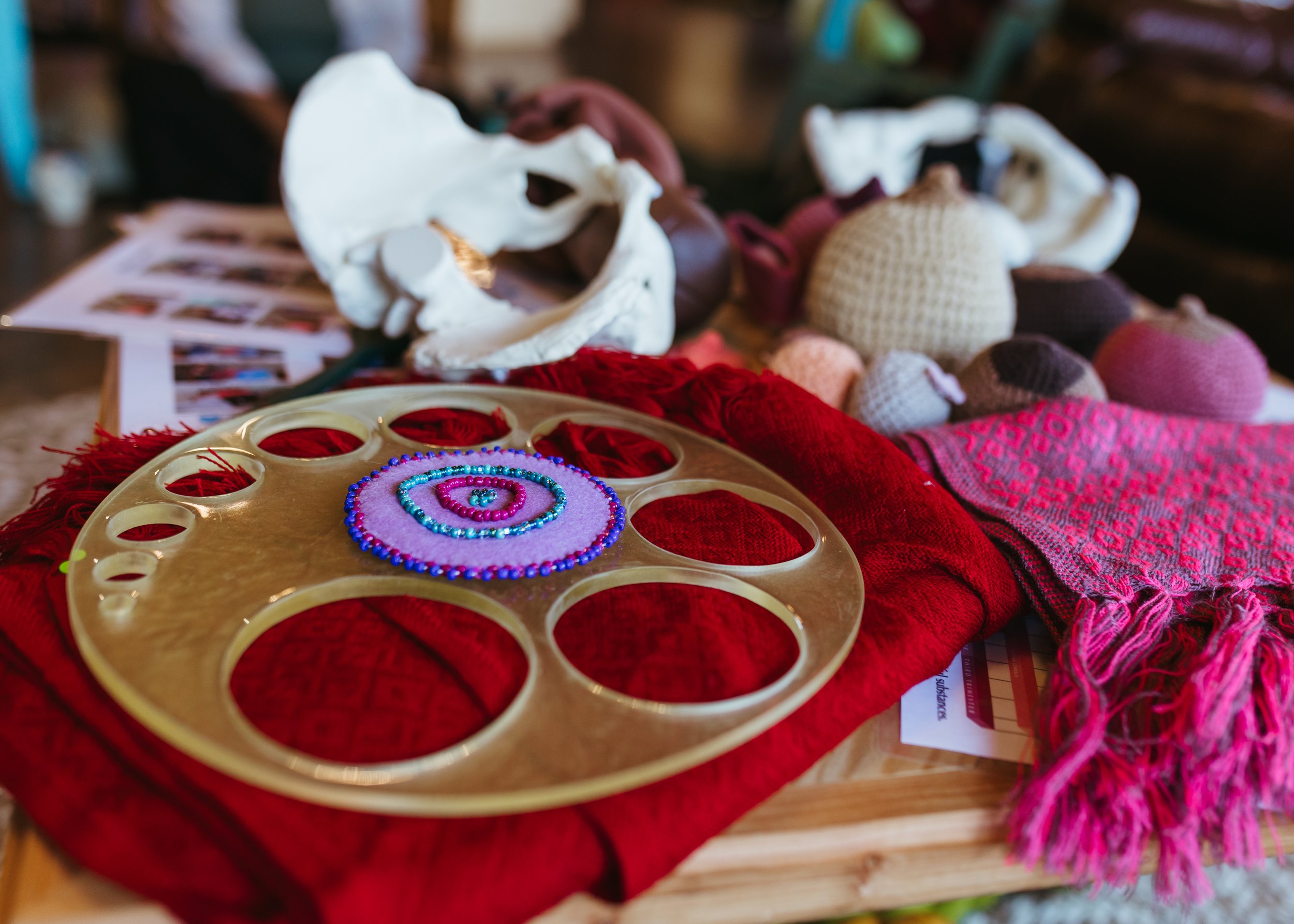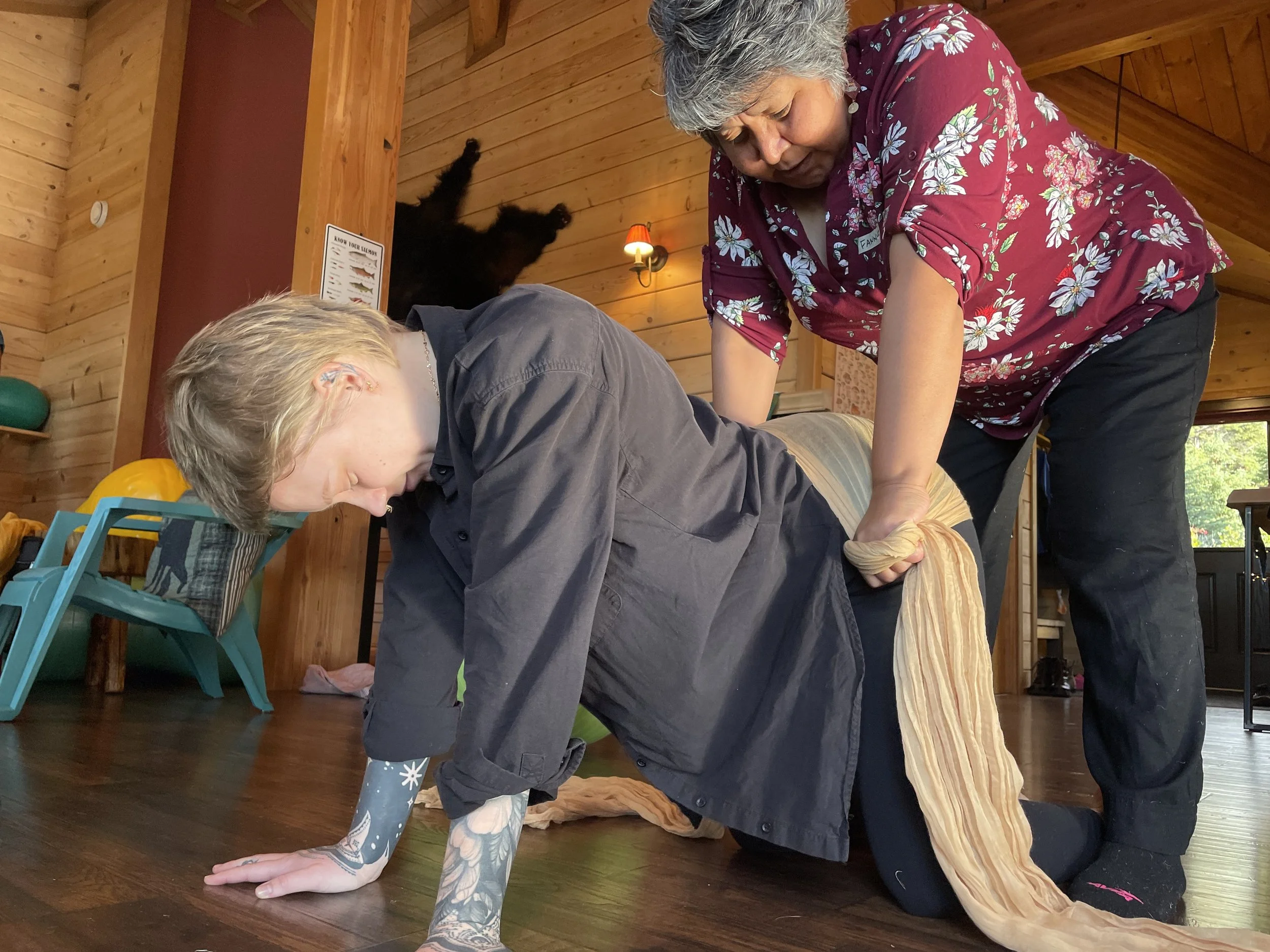
Full Embrace Doula Program
Our Vision of a Future Rooted in Love and Sovereignty
Birth shapes the foundation of a community. It is more than a medical event—it is a rite of passage, a moment of belonging, and a reflection of the values we hold.
We envision a future where every family in Alaska is surrounded by care, where birth is honored as sacred, and where no one has to navigate pregnancy, labor, or postpartum alone. A future where communities have everything they need—skilled birthworkers, trusted support systems, and the ability to sustain traditions that have guided families for generations.
This is a future where traditional birthing knowledge thrives, where no one is forced to leave home for care, and where every baby—whether Indigenous to this land or born into its care—is welcomed with love, care, and responsibility to the land and its peoples. To be born on this land is an honor, and with it comes a shared responsibility: to be held, witnessed, and supported in a way that strengthens families and communities for generations to come.
Because community begins at birth.
Full Embrace’s mission is to increase the number of doulas and birth helpers across Alaska, ensuring that families have support throughout the entire journey—prenatally, for those who give birth locally, and in the postpartum period when families return home. Recognizing that no single approach fits all, we strive to build a doula workforce that reflects Alaska’s diversity, ensuring that families receive care from providers who understand their lived experiences.

The Inaugural Fall 2024 Full Embrace Doula Training cohort, gathered on a deck with a scenic forested backdrop, celebrating their time together. This diverse group includes birthworkers, parents, artists, healthcare professionals, and community members from Anchorage, Mat-Su, Fairbanks, Seward, and Nome—each called to this work by their own experiences and dedication to supporting families in their communities.

A communal altar space illuminated by soft fairy lights, featuring a black-and-white artwork depicting an Inuit mother and child, surrounded by Arctic animals, symbolizing ancestral guidance. The altar holds herbal bundles, tarot cards, sacred icons, and offerings, blending spiritual, cultural, and birthwork traditions. This inclusive practice honors the interconnectedness of lineage, land, and care work, creating a sacred space where participants can reflect, ground themselves, and call upon the wisdom of those who came before them.

Details of the vibrant communal altar space featuring an embroidered uterus artwork framed in wood, symbolizing fertility and creativity. Participants were invited to add their own meaningful pieces, enriching the altar with personal and ancestral connections. The space is adorned with a Saint Olga of Alaska icon, birthing affirmations, candles, dried flowers, and ritual objects, creating a shared sacred space for reflection, grounding, and collective intention.

Guest teacher Tiffany Renée, sits and rolls on a birth ball while demonstrating pelvic movement while using a pelvis model to illustrate key concepts. As she moves, she guides trainees through the mechanics of birth, with the group attentively listening and observing.

Guest teacher and experienced doula Hays Kocinski (they/them), a non-binary birthworker, discussing inclusive doula care with a trainee in a warm, communal learning space.

Guest teacher Morgan Turner, therapist, former doula, and perinatal mental health specialist, teaching about perinatal mood and anxiety disorders (PMADs) and the doula’s role in mental health support.
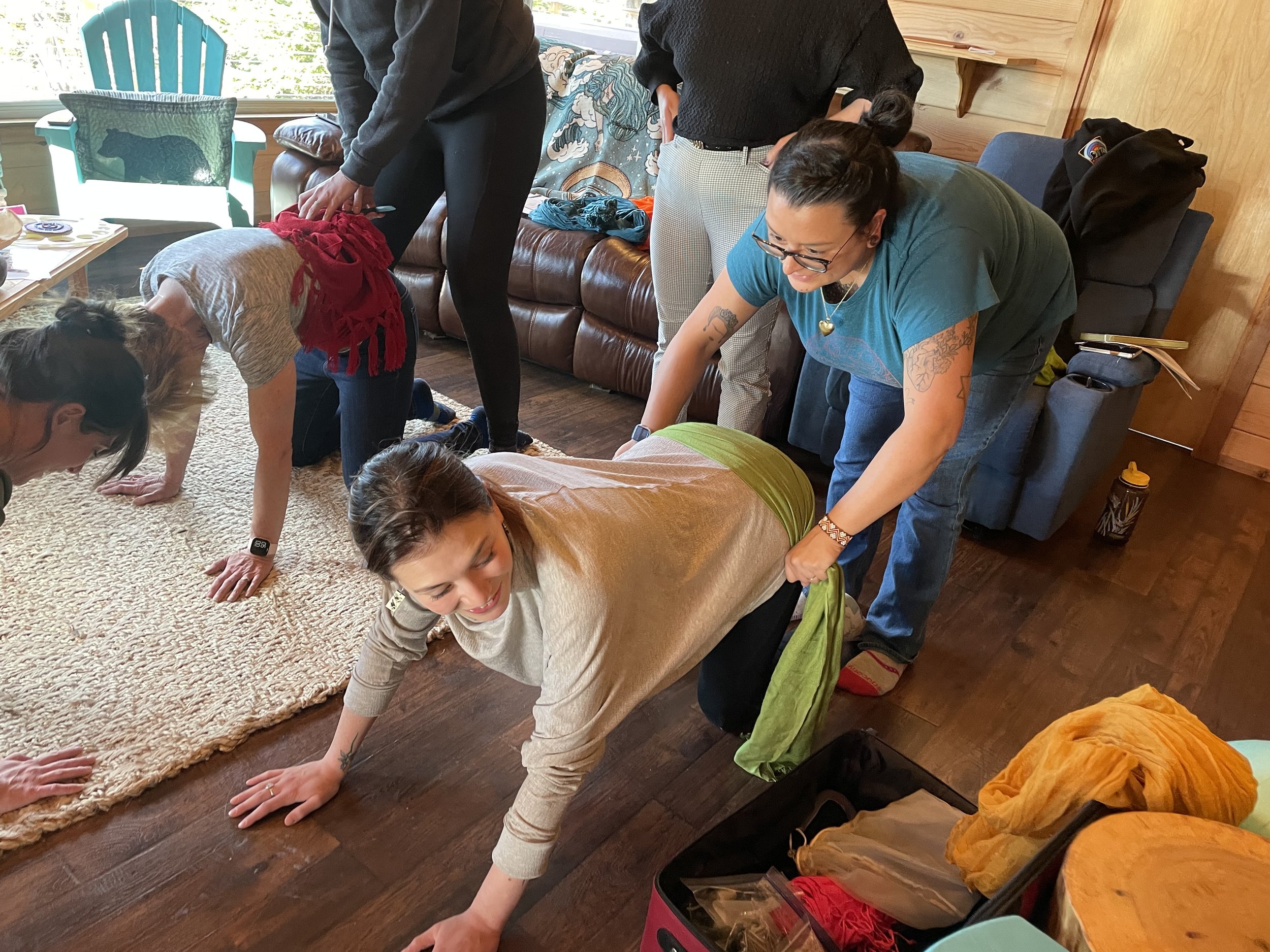
Doula trainees practicing rebozo techniques, using woven fabric to provide support and relief for laboring positions. This hands-on activity helps develop skills for offering comfort and movement assistance during birth.
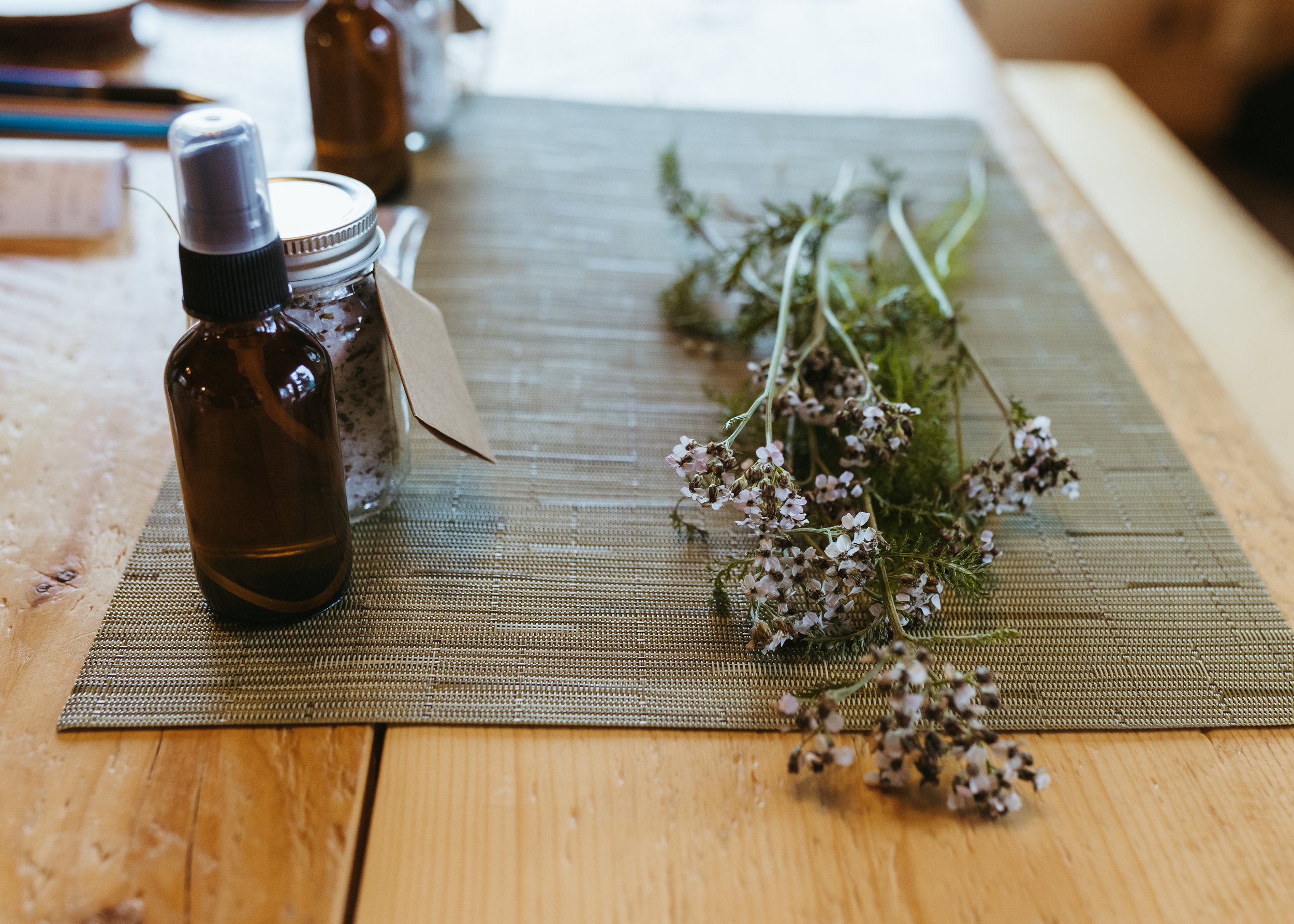
Herbal self-care items, including a spray bottle, a jar of bath salts, and fresh yarrow, arranged on a wooden table.
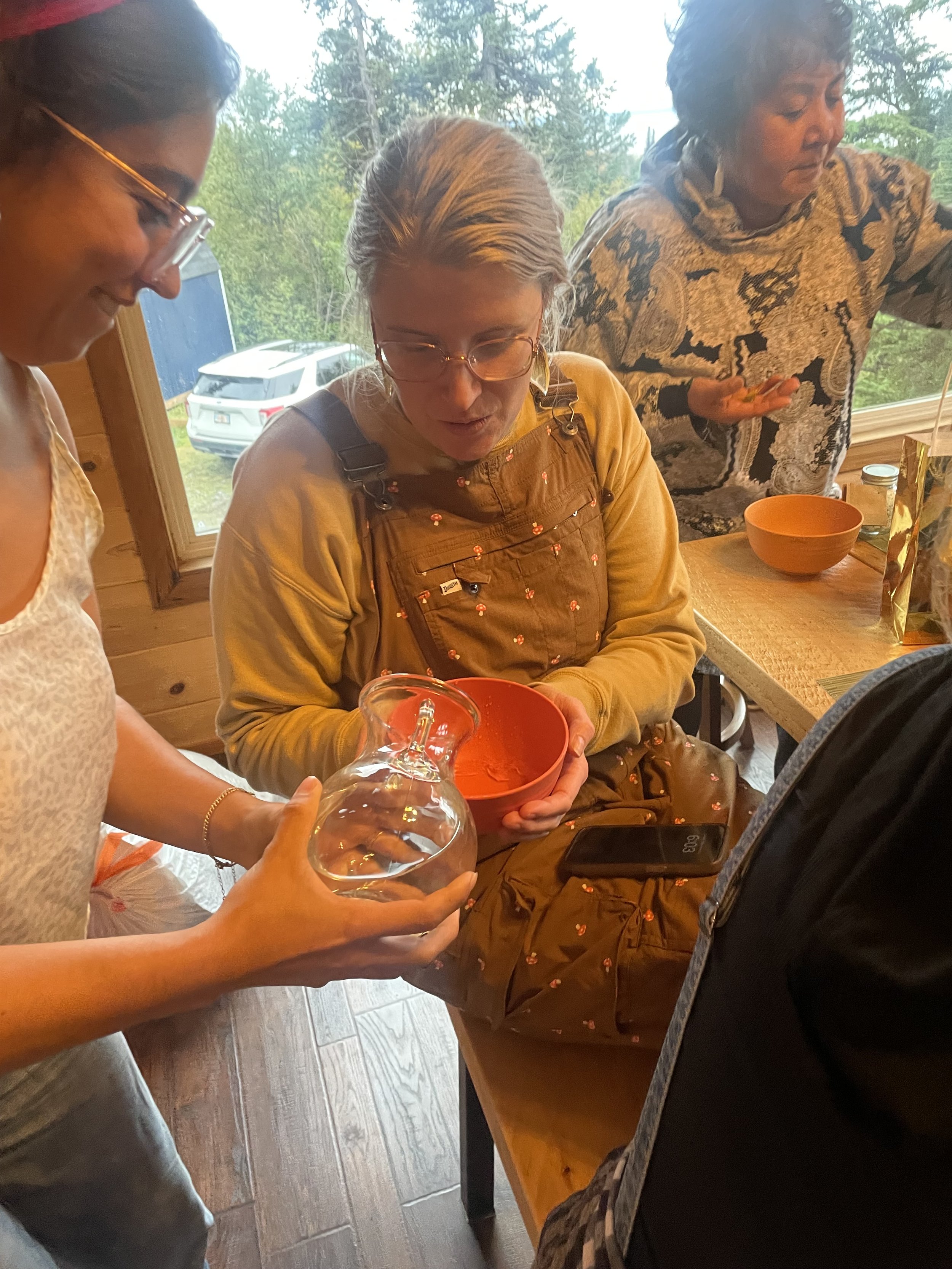
Guest teacher Alivia Feliciano leads doula trainees engaged in a hands-on medicine-making activity, preparing herbal remedies as part of their learning on self-care and community care.
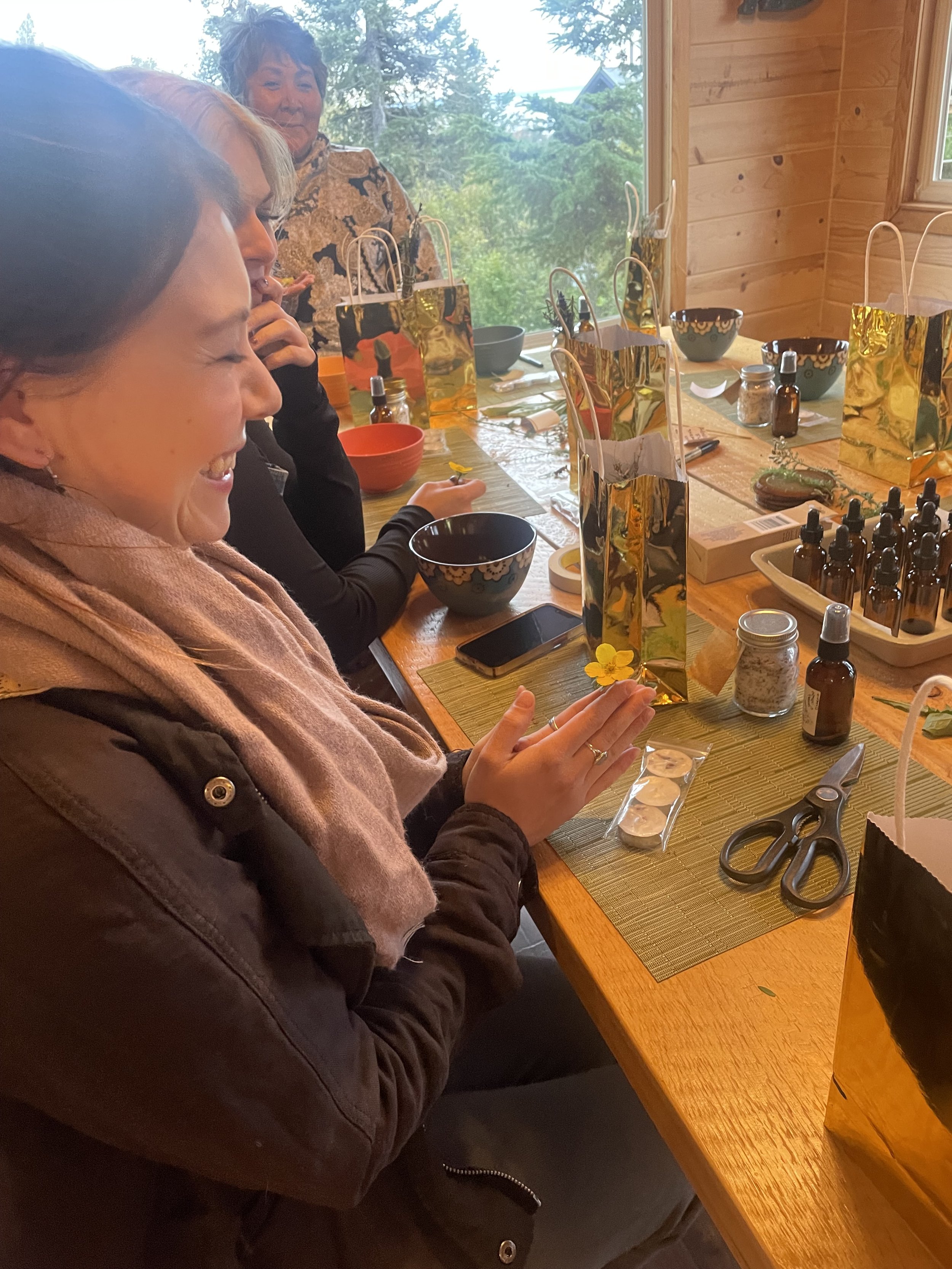
Doula trainees engaged in a hands-on medicine-making activity, preparing herbal remedies as part of their learning on self-care and community care.
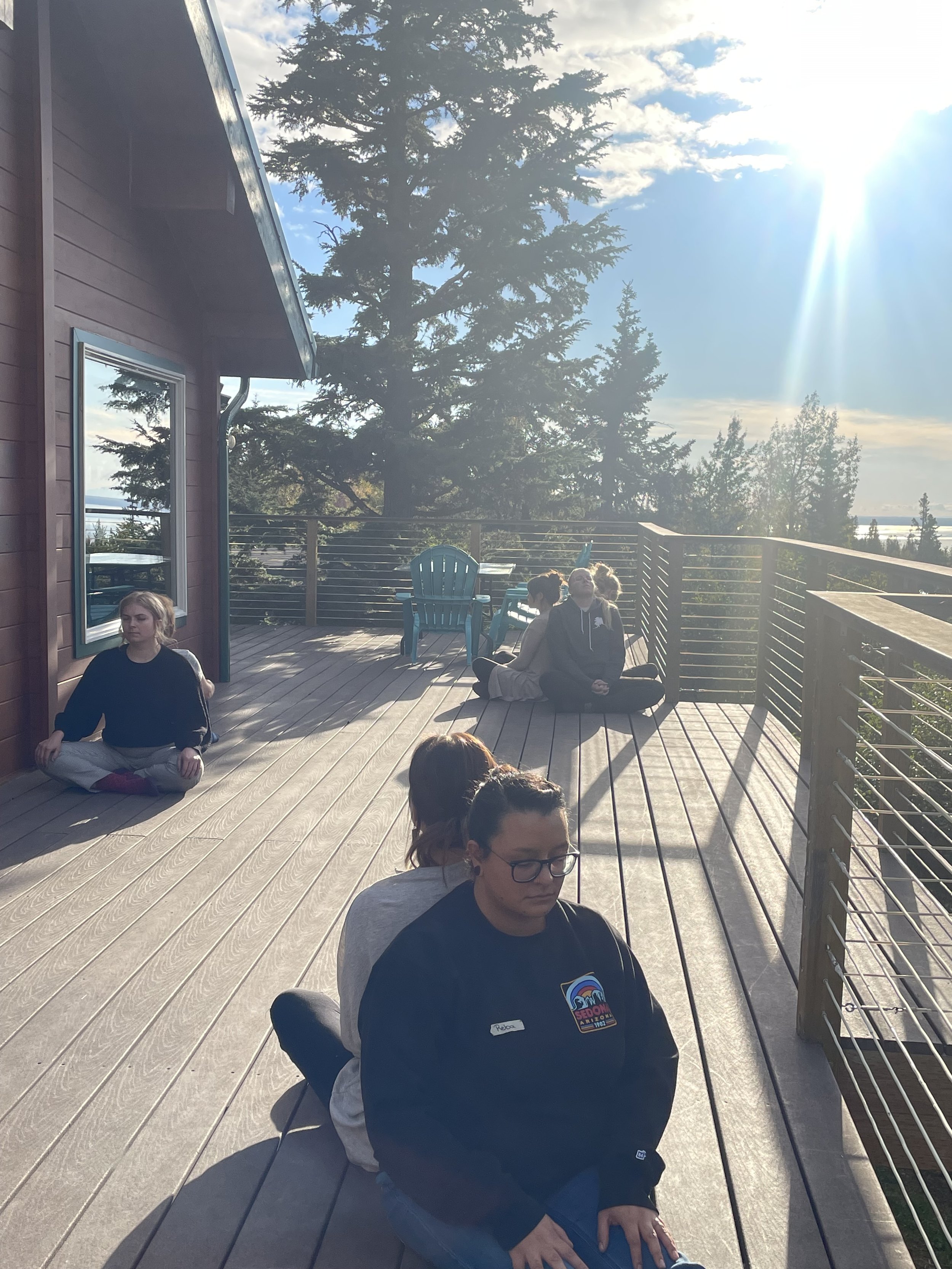
Doula trainees participating in a holding space activity, sitting back to back in silent co-regulation, practicing presence and support without words.
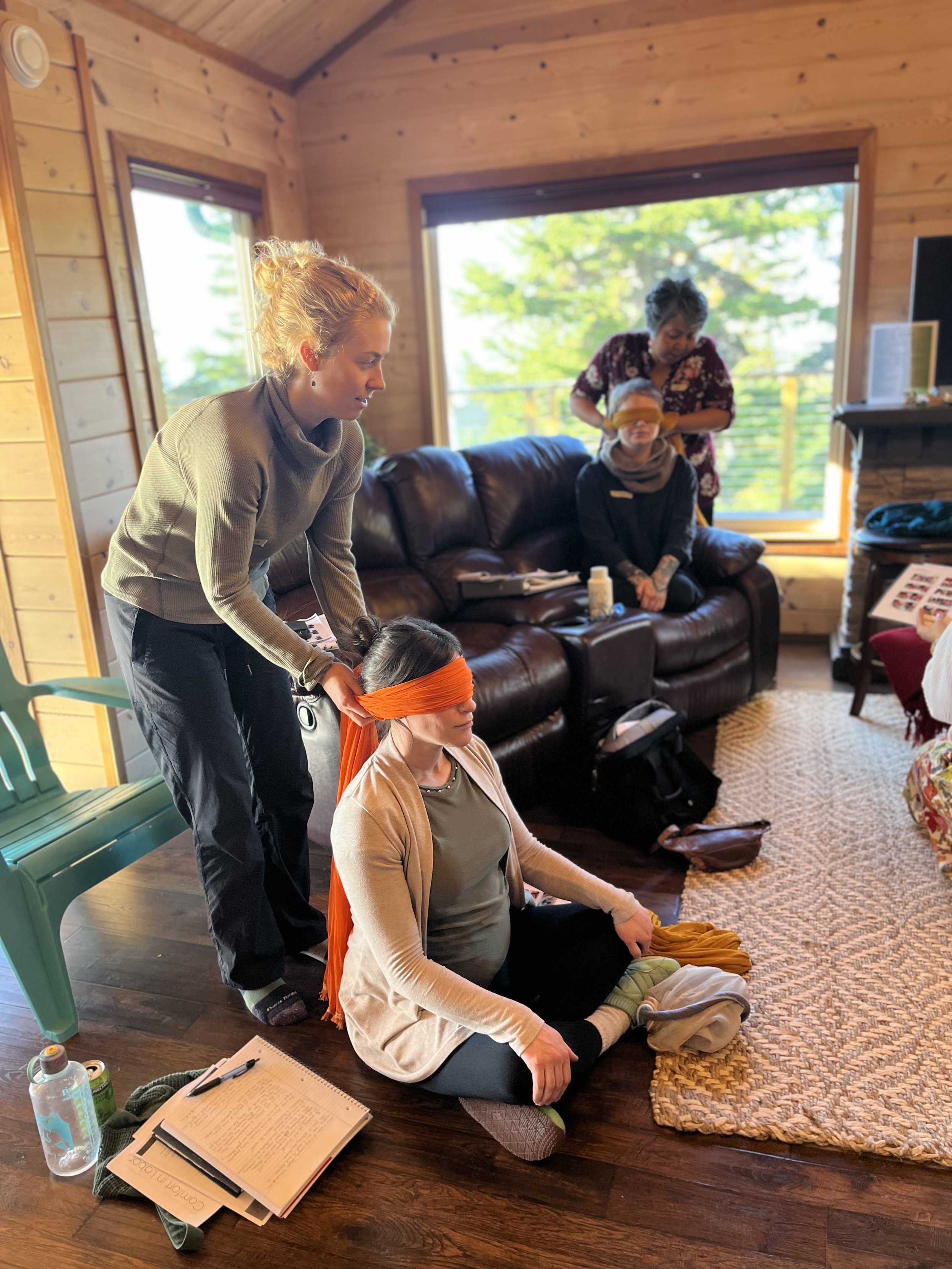
Doula trainees participate in a Sensory Surrender activity, using rebozos as blindfolds to enhance body awareness, trust, and nervous system regulation in a supportive learning environment.

A handout titled “5 Things for Partners to Know About Infant Feeding” in focus, with guest teacher Tiffany Renée leading a discussion about postpartum and lactation support.
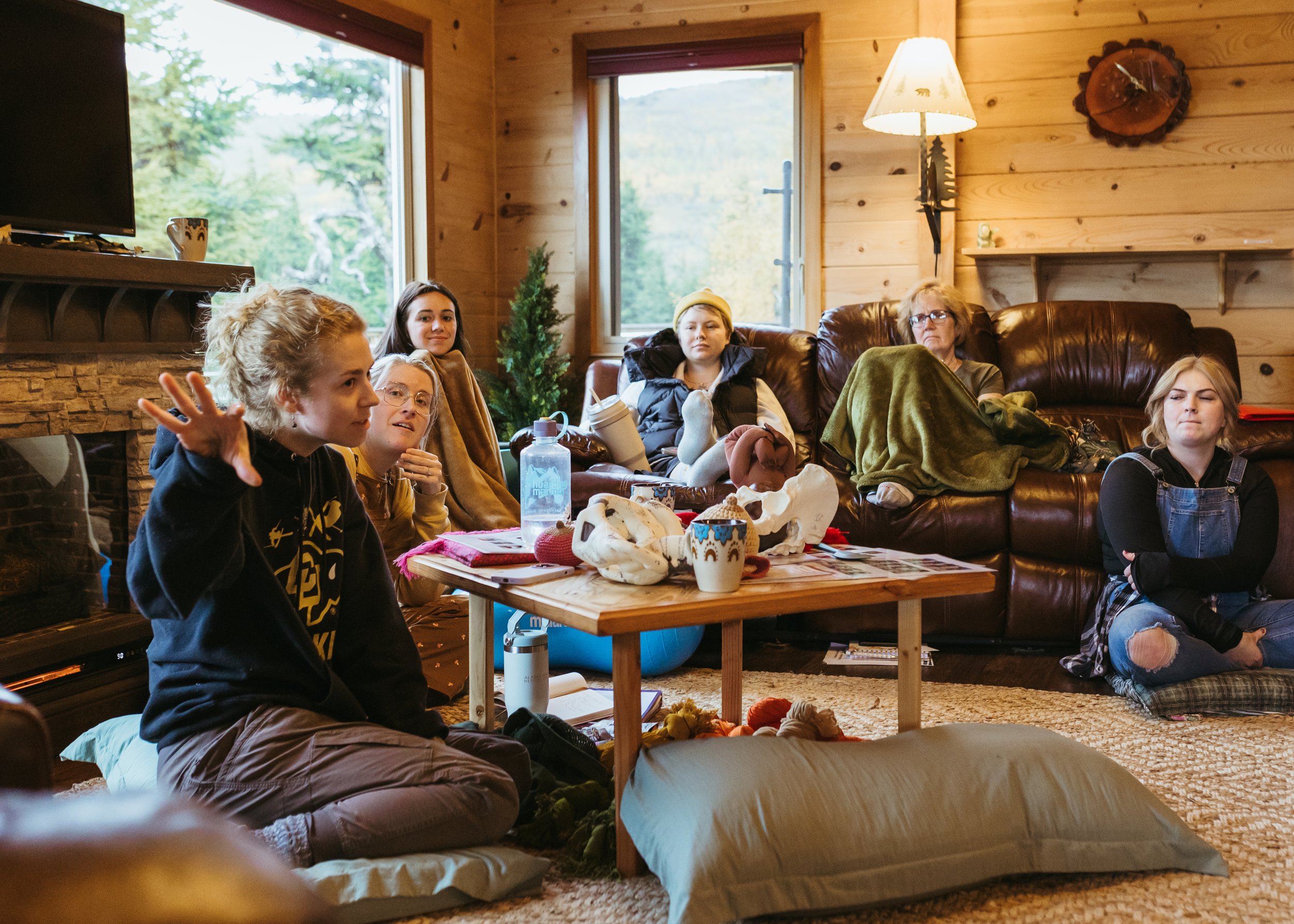
Doula trainees engaged in a group discussion

Doula trainees engaged in a group learning session, with Tiffany Renée leading discussion while participants review printed materials in a cozy, communal setting.

Doula trainees engaged in a group discussion

Birthwork learning materials includingt raining tools including anatomical models, lactation teaching aids, and cultural textiles used in a doula workshop.
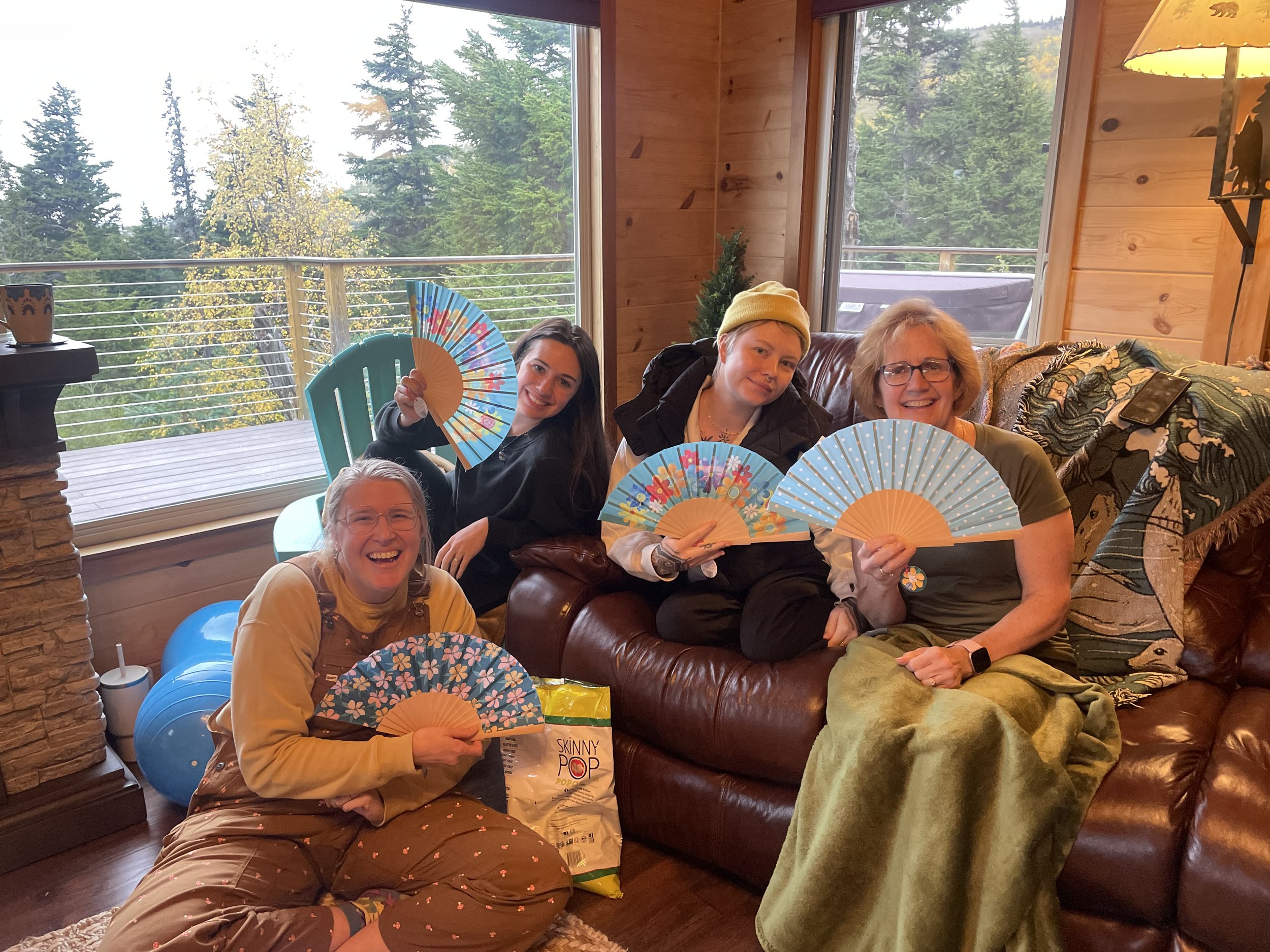
A joyful group of trainees holding decorative fans, celebrating their win after a game of Doula Jeopardy—a fun and engaging activity that reinforced their learning. Fans, a useful tool for doulas, can provide cooling, comfort, and grounding during labor support.

Guest teacher Alivia Feliciano and a trainee engaged in conversation at a wooden table, surrounded by herbal self-care items and learning materials.
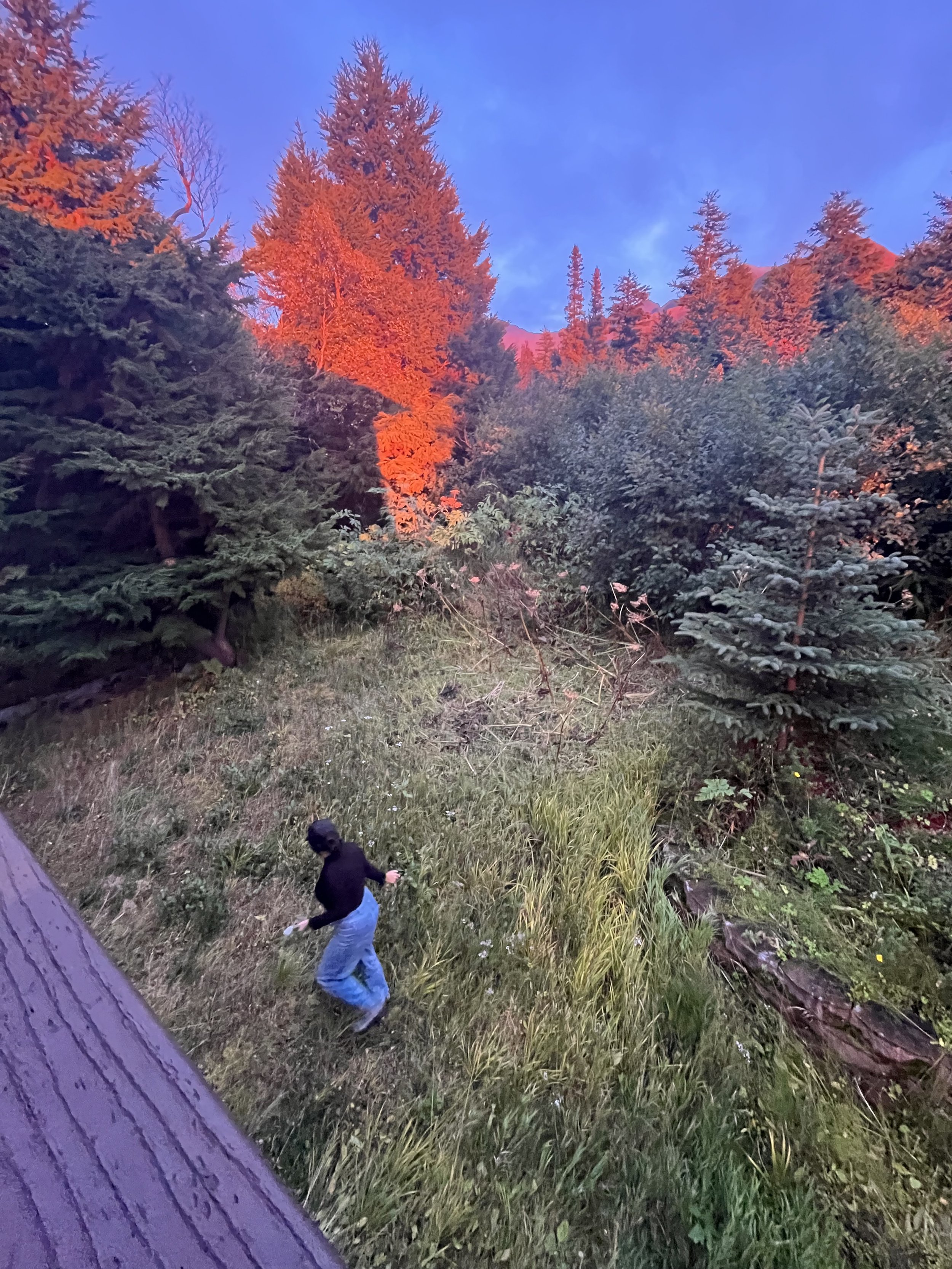
Alivia Feliciano gently and responsibly gathering plants for medicine-making outdoors at dusk, moving through the grass as the trees glow red in the fading light.
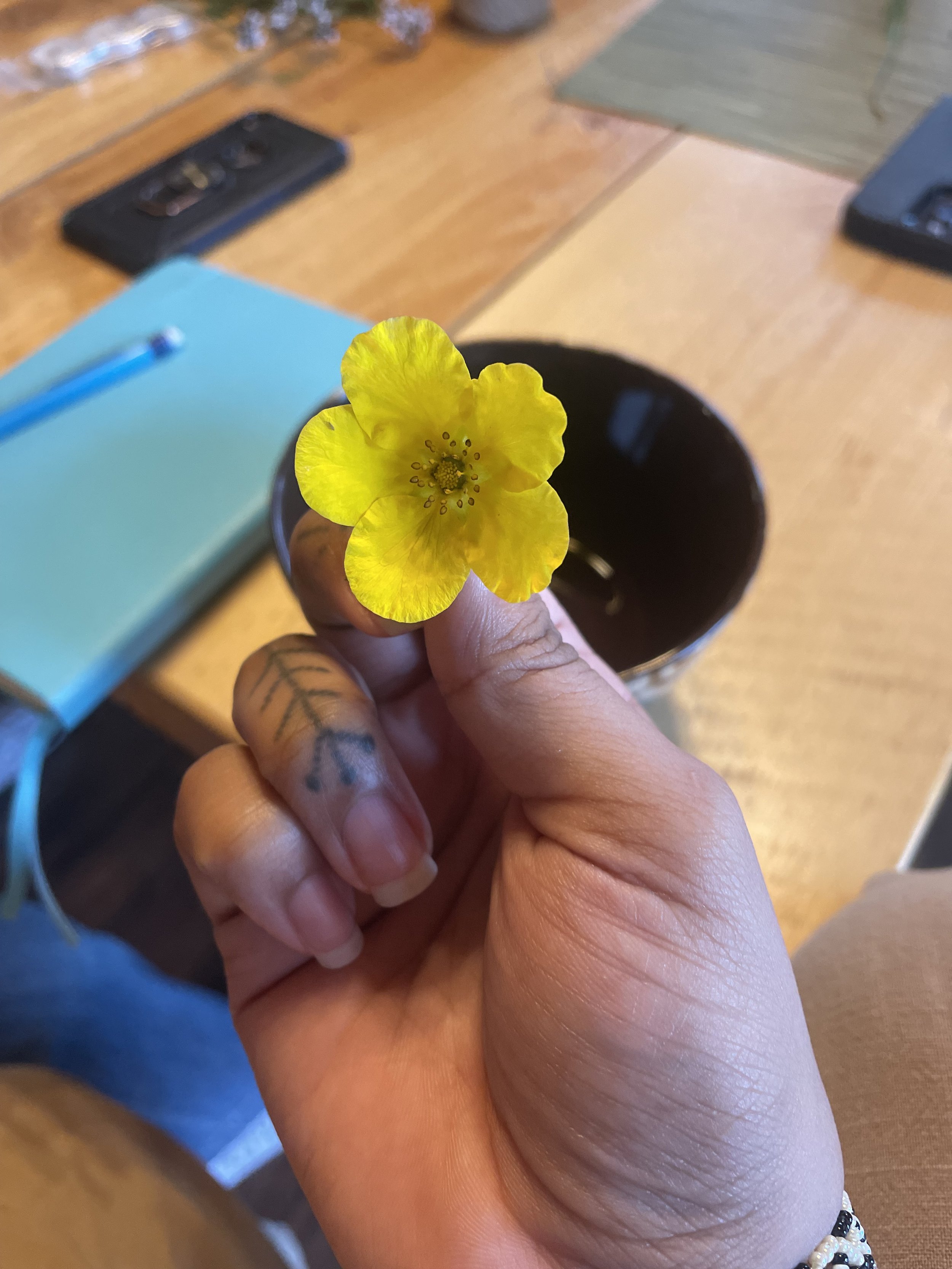
Founder Dalecia Young savors the beauty of the transformative weekend of training, holding a delicate yellow flower gathered for medicine-making—a quiet moment of reflection on the depth of learning, connection, and care shared among doulas and birth helpers.
Hosting a Training in Your Community
-
For many birthing people in Alaska, access to birth support is not just about comfort—it is a matter of safety, survival, and justice.
The Alaska Maternal Child Death Review (MCDR) Committee has identified violence as one of the leading causes of preventable maternal deaths, disproportionately impacting Indigenous, rural, and historically excluded communities.
Increasing access to community-based doulas and birth helpers is a key strategy in reducing these disparities and ensuring safer birth experiences.
Why This Matters
✔️ Maternal safety & social support – Doulas and birth helpers create safer birth environments by providing trauma-informed care and strengthening social support networks.
✔️ Breaking cycles of harm – Many people experiencing violence during pregnancy lack access to safe, culturally matched healthcare providers—doulas and birth helpers can be trusted advocates.
✔️ Disrupting systemic disparities – Indigenous, Black, and birthing Peoples of Color in Alaska face disproportionate maternal mortality rates. Community-based birth support improves outcomes and saves lives.
💡 More than birthwork, this training is about justice, sovereignty, and ensuring no family navigates birth alone.
-
Full Embrace partners with organizations within Alaska invested in birth equity, community care, and culturally matched support.
✔️ Tribal health organizations, rural clinics, and birth centers integrating doulas into perinatal care.
✔️ Community-based nonprofits serving Indigenous, Black, and historically excluded families.
✔️ Educational institutions expanding perinatal workforce development.
✔️ Grassroots birth work collectives & mutual aid networks sustaining community-led birth support.
If you want to bring birth support back into the hands of your community, you are an ideal host.
-
Full Embrace is a core curriculum—a comprehensive foundation designed to be adapted to reflect the birth traditions, strengths, and realities of each community.
✔️ We provide a flexible yet robust framework that aligns with local birthing practices, cultural knowledge, and regional challenges.
✔️ We collaborate with local guest teachers, elders, and birthworkers to ensure the training is community-informed and community-driven.
✔️ Discussions, activities, and case studies reflect the realities of birthwork in urban hospitals, rural villages, birth centers, and home birth settings.
✔️ We acknowledge the impact of birth evacuations, offering strategies for supporting families who must leave their home communities to give birth.
📢 By hosting, you are co-creating an experience that honors your community’s wisdom, birth traditions, and ways of knowing.
-
As a host organization, you will receive:
✔️ A fully developed, expertly facilitated training program
✔️ Ongoing support from Full Embrace educators & mentors
✔️ Training materials, outreach resources, and structured guidance
✔️ Assistance in engaging and recruiting participants
🎯 You don’t have to do this alone—we support you at every stage.
-
We are committed to keeping this training affordable and accessible. Thanks to financial support from the State of Alaska Division of Public Health, we offer the training at a significantly reduced cost. Additional scholarships and funding opportunities are available to ensure participation is not a financial barrier.
Collaborative & Flexible Cost-Sharing
We recognize that every community has different resources and capacities. Instead of a one-size-fits-all model, we work with host organizations to find a plan that fits their strengths.
🌿 Host organizations may contribute in ways that make sense for them, such as:
✔️ Providing a venue – A community center, clinic, or cultural space.
✔️ Supplying meals and refreshments – Creating a welcoming environment.
✔️ Helping with training materials – Printing manuals or handouts.
✔️ Assisting with travel and lodging – Supporting accommodations if needed.
✔️ Offering scholarships for trainees – Ensuring local participation.
✔️ Providing childcare support – Making the training accessible for parents.
We co-create a plan that meets your unique needs while ensuring accessibility for all participants.
-
Hosting Full Embrace is an investment in birth justice and community resilience.
✔️ Ensuring families have access to doulas trained in their own communities—people who share their culture, language, and lived experiences.
✔️ Sustaining local birth support networks that prevent maternal deaths and improve outcomes.
✔️ Creating job pathways for future birthworkers through mentorship, skills training, and community-led opportunities.
✔️ Strengthening birth sovereignty—supporting the reclamation of traditional practices and keeping birth work in the hands of the community.
🌟 You are not just a host—you are part of a movement to reshape birth care in Alaska.
-
Hosting is not just a one-time event—it’s a step toward sustainable, community-led birth support. Here’s what to expect:
✔️ Step 1: Interest Form Submission – Let us know you’re interested.
✔️ Step 2: Community Engagement & Support – Gather letters of support or endorsements.
✔️ Step 3: Planning Call – Discuss your goals, logistics, and funding considerations.
✔️ Step 4: Recruitment & Outreach – Work together to spread the word and recruit trainees.
✔️ Step 5: Finalizing Logistics – Confirm venue, guest educators, and any cultural adjustments.
✔️ Step 6: Hosting the Training – A hands-on experience with mentorship and skill-building.
✔️ Step 7: Ongoing Support & Integration – Continued mentorship and pathways for doulas.
This is more than just a training—it’s a long-term investment in birth support for your community.
-
➤ Hosting Full Embrace is more than just bringing a training to your community—it’s about ensuring lasting impact and broad community engagement. We work alongside hosts to make the process accessible, collaborative, and tailored to their needs.
Here’s what to expect in the hosting process:
✔️ Step 1: Interest Form Submission – Begin by completing the Community Host Interest Form to let us know you’re interested in bringing the training to your community.
✔️ Step 2: Gather Community Engagement & Support – We encourage hosts to collect letters of support, endorsements, or petitions from families, birthworkers, healthcare providers, and organizations. This helps demonstrate community investment and ensures that the training is widely accessible.
✔️ Step 3: Initial Inquiry & Planning Call – Once we receive your Interest Form, we’ll schedule a call to discuss your goals, community needs, logistics, and funding considerations.
✔️ Step 4: Recruitment & Outreach – Together, we work to spread the word and recruit a diverse group of trainees. This may include outreach to grassroots networks, healthcare providers, tribal organizations, and family support programs.
✔️ Step 5: Finalizing Logistics – We collaborate with hosts to confirm venue details, guest educators, childcare support, and any culturally relevant curriculum adjustments that fit the needs of each community.
✔️ Step 6: Hosting the Training – A dynamic, hands-on experience where trainees develop skills, connect with mentors, and build relationships that will sustain them beyond the training.
✔️ Step 7: Ongoing Support & Integration – After the training, Full Embrace provides continued mentorship and connection to opportunities for doulas and birth helpers. Hosts are encouraged to support pathways for trainees to serve their communities, whether through independent practice, local healthcare systems, or community doula programs.
Hosting is not just a one-time event—it’s a step toward strengthening birth support in your community for years to come.
Training with Full Embrace
-
Full Embrace Doula Training is more than just a certification—it’s a community, a support system, and a space to growinto your calling. Rooted in Alaska’s lands, cultures, and people, this training nurtures doulas as they step into their role as trusted companions during pregnancy, birth, and postpartum.
✔️ Grounded in Culture & Community – We honor the traditions, knowledge, and birth practices of Indigenous and diverse communities in Alaska, ensuring doulas are trained with humility, respect, and cultural attunement.
✔️ Learning Through Connection – This training goes beyond textbooks—you’ll learn from real families, experienced mentors, and each other through hands-on practice, storytelling, and shared wisdom.
✔️ More Than a Certification—A Commitment to Care – Every Full Embrace trainee gives back by supporting families in their own communities through the Community-Supported Doula Program.
✔️ Expanding Doula Care Across Alaska – Full Embrace doulas are already making a difference in Anchorage, Nome, Seward, Mat-Su, and Fairbanks, bringing compassionate, community-driven care to families across the state.
-
Full Embrace’s training is grounded in community-centered birth justice, centering the histories, experiences, and knowledge of Black, Indigenous, and other people of color in birthwork. While designed with BIPOC birthworkers in mind, these lessons are valuable to anyone committed to providing equitable, culturally responsive care in Alaska.
If you do not identify as Black, Indigenous, or a person of color, we welcome and invite you to engage with this material in a way that:
🌿 Encourages deep listening and reflection. Some topics may be new or challenging—this is an opportunity to learn and grow.
🌿 Honors different experiences and perspectives. Birth traditions are deeply rooted in culture and community. Show up as a supporter and advocate without centering yourself.
🌿 Respects boundaries and avoids appropriation. Many practices in birthwork have been reclaimed after generations of suppression. Support this reclamation by uplifting, not adopting or claiming.
🌿 Commits to meaningful action. Learning is just the first step—true support comes through action, advocacy, and showing up in thoughtful, respectful ways.
This is a space for learning, connection, and shared commitment to ensuring all families in Alaska receive the care they deserve. We’re glad you’re here.
-
The Full Embrace curriculum is structured to equip doulas with the skills, knowledge, and confidence to support families through pregnancy, birth, and postpartum.
Core Doula Foundations
✔️ Doula Scope, Practice & Ethics – Understanding professional boundaries, advocacy, and ethical care.
✔️ Birth Planning & Preferences – Helping families make informed decisions about their care.
✔️ Life on Call – Preparing for on-call responsibilities, self-care, and time management.
Pregnancy & Birth Support
✔️ Prenatal Care & Common Concerns – Understanding physiological changes and diverse pregnancy experiences.
✔️ Physiology & Anatomy of Birth – Comprehensive knowledge of labor, birth, and lactation.
✔️ Hands-On Comfort Measures – Techniques for labor support, including rebozo use and counterpressure.
✔️ Navigating Interventions – Supporting families in making informed choices about medical interventions.
✔️ Stages of Labor & Doula Support – Recognizing labor progression and adapting doula care.
Postpartum & Family Well-Being
✔️ The Immediate Postpartum & Fourth Trimester – Supporting healing, newborn care, and family adjustment.
✔️ Mental Health & PMADs (Perinatal Mood & Anxiety Disorders) – Recognizing and addressing perinatal mental health concerns.
✔️ Safe Infant Feeding & Sleep – Evidence-based guidance on newborn care.
✔️ Nourishment & Nutrition – Supporting healthy eating during pregnancy and postpartum.
Culturally Attuned & Trauma-Informed Care
✔️ Trauma-Informed Doula Support – Creating emotional safety and recognizing trauma in birthwork.
✔️ Community Engagement & Advocacy – Strengthening birth justice efforts and acting as a resource.
-
🎓 A Comprehensive Doula Training – Covering pregnancy, labor support, postpartum care, and advocacy.
🧡 Trauma-Informed, Culturally Responsive Approach – Rooted in community and birth sovereignty.
🤝 Hands-On Mentorship & Real-World Experience – Supporting families through pregnancy, birth, and beyond.
🌎 A Lifelong Community – A network of doulas, birthworkers, and mentors who uplift and support you.
Trainees have described this experience as “more than just training—it was transformational.”
-
If you’ve ever felt the pull to walk alongside families during birth, to be a calming presence in their most tender moments, and to be part of something bigger—this is your invitation.
What Trainees Have Said About Full Embrace
💬 “This course and being in community with everyone really showed me how much I care about this work.”
💬 “I want to apply everything I’ve learned—I realized how much I need my own self-care while also supporting others.”
💬 “Being surrounded by so many passionate, knowledgeable people made me a better doula.”
💬 “This wasn’t just training—it was transformational.”
-
• “This course and being in community with everyone really showed me how much I care about this work.”
• “I want to apply everything I’ve learned—I realized how much I need my own self-care while also supporting others.”
• “Being surrounded by so many passionate, knowledgeable people made me a better doula.”
• “This wasn’t just training—it was transformational.”
Our Impact: How the Community Doula Program is Supporting Families
The Community Doula Program is bridging gaps in perinatal care, ensuring that families receive the support they need during pregnancy, birth, and postpartum.
By training and mentoring culturally attuned doulas and birth helpers, we are strengthening birth equity across Alaska.
• 🕒 700+ Hours of Doula Support
• 🏡 40+ Families Served
• 💙 65% Increase in Social Support
• 🩺 45% Maternal Safety Improvement
Who Benefited from the Community Doula Program
Community Partner Host Interest Form
Thank you for your interest in partnering with our program to support community-centered doula care. Please complete this form to provide details about your organization and how you envision collaborating with us. We will follow up to discuss potential partnership opportunities.
Doula Trainee Interest Form
Thank you for your interest in our doula training program! Please complete this form to help us learn more about you, your goals, and how we can support your journey as a community doula.
This program is supported by OASH Cooperative Agreement ASTWH210203, “Alaska Maternal Child Death Review (MCDR): Implementation of MCDR Committee Recommendations to Reduce Racial Disparities and Maternal Deaths Due to Violence.”
We are deeply grateful for this support, which allows us to continue our work in improving maternal health outcomes and addressing racial disparities in care.
Its contents are solely the responsibility of the authors and do not necessarily represent the official views of the Office on Women’s Health (OWH), the Office of the Assistant Secretary for Health (OASH), or the U.S. Department of Health and Human Services (HHS).


